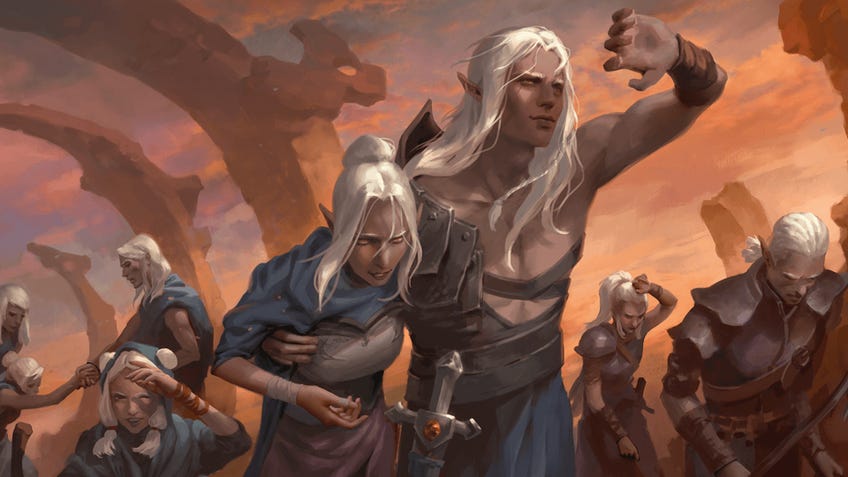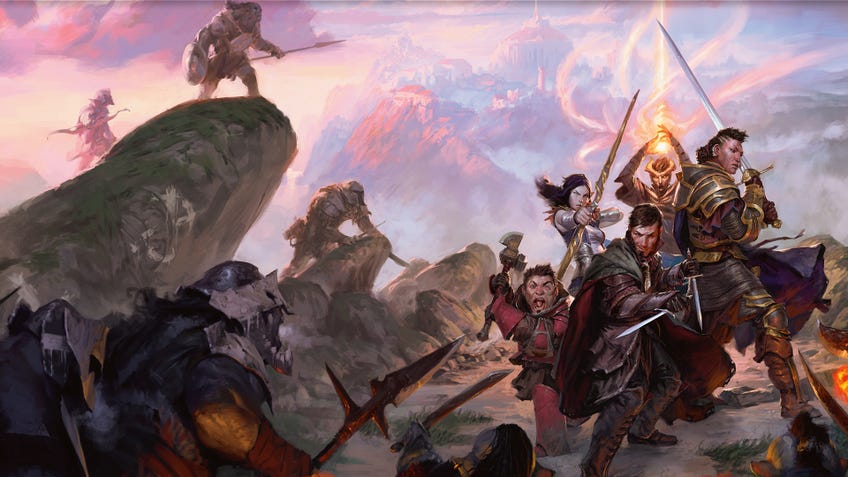Railroading doesn’t have to be a dirty word in tabletop RPGs
Giving players just enough guidance can enhance, rather than diminish, their role in a story and world.
The word ‘railroading’ is a heavy one in tabletop RPGs. It’s a term that often triggers a fight-or-flight instinct in players, and is generally seen as a negative thing. But, when used carefully, railroading can make the experience of playing a tabletop RPG better - rather than worse.
Railroading is when a game master forces an RPG down a predetermined story path that they’ve already decided the outcome or main beats of - and, as such, it cannot be changed regardless of what the players do. Like its namesake, the action or plot travels along a single direct line with zero chance to take another route. When a game master ‘railroads’, it’s typically seen as an unfavourable thing to do in the eyes of players, because it seemingly contradicts the free will that many roleplaying games put front and centre.
“Make your own decisions.” “Change destiny.” “The choice is yours.” These are all phrases I’ve heard used when trying to convince people to get into tabletop roleplaying. That agency is exciting and appealing, particularly to new players. It’s their chance to be part of a story where their characters, who they’ve put their heart and soul into creating, are the focus and pivotal to the world’s progress. With that promise, who wouldn’t feel that their character and their actions were important? And, if that’s the case, who can blame players for despising railroading if it takes things out of their hands?

It’s a common gripe from players that railroading is the game master trying to stop players having fun. But dismissing railroading as GMs simply stopping the players because they disagree with their decisions fails to acknowledge something very important: the lack of communication between players and their game master that leads to a breakdown of collaboration.
As a GM, making sure players know that, while they are important to the world, they aren’t in complete control of what makes that world tick is one of the first things to convey before getting into a campaign. It’s a discussion that's open and lets both parties know that while players finding their own route from point A to point B is still very important, it doesn’t necessarily change the key plot points that a game master has planned along the way. A level of accepted guidance doesn’t negate what the player characters do, but allows a collaboration from the get-go.
A level of accepted guidance doesn’t negate what the player characters do, but allows a collaboration from the get-go.
Starting in a small village and advancing to a huge, bustling city may always happen, but the journey gives players ripe opportunities to explore their characters without feeling as though they were thrown into a quest or situation that doesn’t fit with who they are. If you feel like your character isn’t interested in anything happening then a serious discussion needs to take place, because you’ll feel like you're being railroaded regardless of what you do.
Talking to your players about what they are looking for is important, and can help establish the format of your adventure: will it be a sandbox exploration where anything goes, or a more linear path with some opportunities to branch out and have fun? As long as it’s communicated clearly, the game master and players can play in harmony.

The GM nudging players in the right direction can be perfect for people who are new to tabletop roleplaying games, or just need that extra helping hand when it comes to deciding where to go. If you have a multitude of options, but no group consensus or determined party ‘leader’ to make the call, the responsibility of choosing where to go next can feel daunting. There’s nothing worse than feeling trapped by indecision, especially when some roleplaying sessions can last as little as 45 minutes - putting pressure on the party and even going so far as to kill their enjoyment.
There’s also the possibility that the players aren’t communicating effectively between themselves. One player could be determined to roleplay most of their encounters, whereas others may just want to get into combat - and there’s always that one person who just wants to try and steal as much as humanly possible. With that amount of potential variety, it’s not uncommon for players to head off in five different directions and leave the GM’s original plan for a story in the dust.
The GM nudging players in the right direction can be perfect for people who are new to tabletop roleplaying games, or just need that extra helping hand.
Groups should enjoy games in whatever way is most comfortable for all of the players, but game masters shouldn’t be afraid to steer players down the right path every now and then. Sometimes that support is essential.
While some game masters are fine with doing things on the fly, there are those who will see these different factors and feel as though they need to pull a miracle out of somewhere in order to get everyone back on track. As long it doesn’t feel like the GM is forcing players on a pre-planned route by taking note of the player choices made to get there, and those decisions don’t end up screwing the whole world up, the linear path is never really considered linear in the first place.

